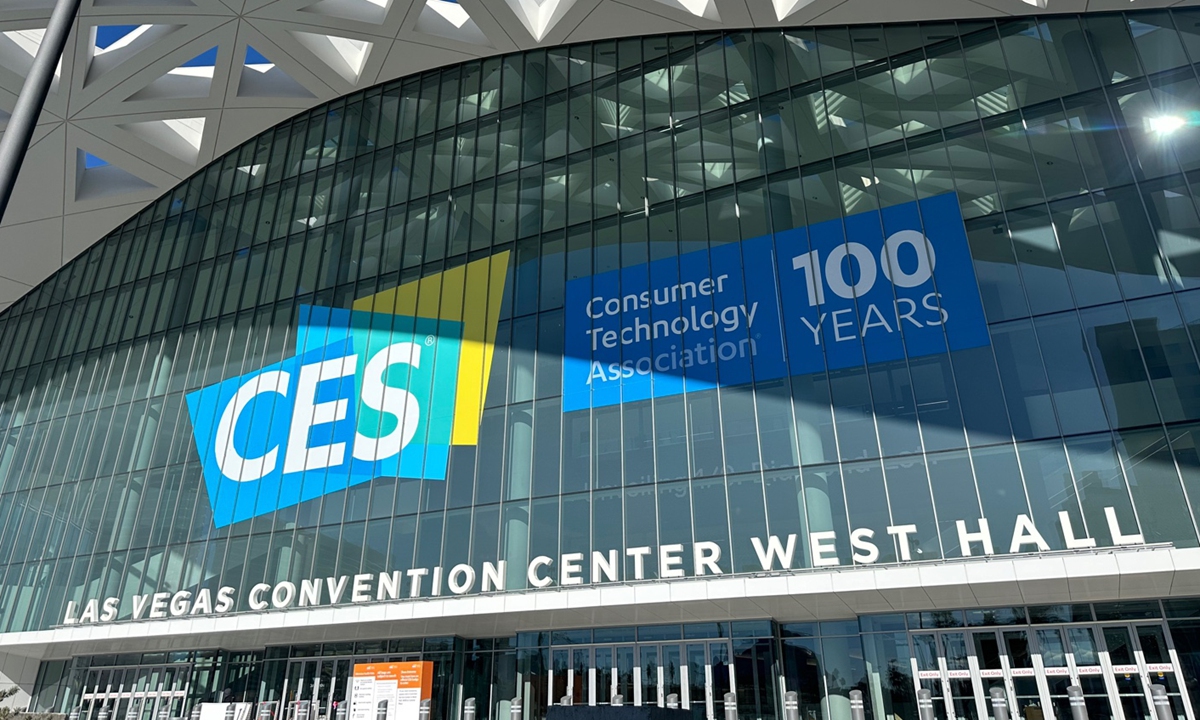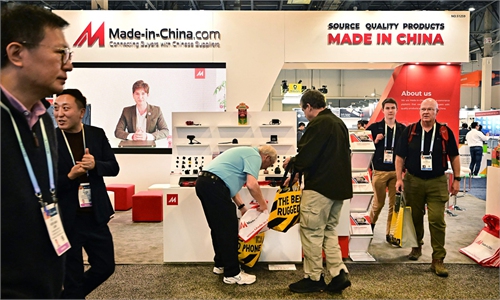
A view of the west hall of Las Vegas Convention Center in the US on January 8, 2024 Photo: VCG
The annual CES (formerly known as the Consumer Electronics Show) is set to take place in Las Vegas, the US. It is reported that around 4,000 exhibitors from around the world have registered to attend, with more than 30 percent of them coming from China. However, latest media reports indicated that many employees from Chinese technology companies were denied US visas despite holding invitations to attend. Some commentators have called this visa rejection "unprecedented." So far, there has been no official response from the US government on this matter. We urge the US Department of State to verify relevant reports as soon as possible, reduce visa and entry policy obstacles, facilitate normal people-to-people business and industrial exchanges between the two countries, and implement the consensus reached by the two heads of state.
CES is one of the world's largest and most influential tech trade shows, which is organized by the Consumer Technology Association and held annually in January in Las Vegas. Often referred to as the annual "barometer" of the consumer electronics industry, it has been described as "a kaleidoscope of innovation, offering a glimpse of the intersection between technological vision and real life." At the 2024 CES, showcased products included snore-reducing pillows, bird-identifying binoculars, virtual automotive assistants, and electric bicycles integrated with ChatGPT, among others. The upcoming 2025 CES, scheduled for next month, will focus on themes such as artificial intelligence, digital health, and autonomous driving. It is clear from this that CES serves as a bridge connecting cutting-edge technology to everyday life scenarios to some extent. It is far from the words like geopolitics, superpower games, or national security.
For many years, Chinese companies have been the mainstay of exhibitors at CES. As early as the 1990s, when the internet industry was just emerging, some people described Chinese electronics manufacturers as going to CES at the beginning of each year as if they were "attending a market." This reflected the strength of the US technology sector. In recent years, with the rapid advancement of China's tech industry, Chinese "smart manufacturing" has become increasingly prominent at the exhibition. As China is a major producer and consumer of electronics, many US companies and international consumers are eager to interact with Chinese firms at the CES, which contributes to the event's greater influence. In this process, businesses expanded their markets, consumers enjoyed convenience, and a green, low-carbon lifestyle was promoted, creating a typical win-win scenario.
For this reason, the large-scale visa denials faced by Chinese companies have left even the American side, including the event organizers, stunned. Chris Pereira, the founder of iMpact, a New York-based consultancy, said exhibitions like CES were "wonderful opportunities for business exchanges between companies from China, the US, and the rest of the world, but now it is frustrating to see even events like this being impacted."
A CES spokesperson stated that they encourage the US government to expedite and approve visas for individuals who are traveling to the US for legitimate business reasons. We hope that the relevant US departments will heed this appeal as soon as possible.
In the past, some Chinese companies were unable to attend CES mainly due to the impact of unilateral sanctions imposed by the US, but this is the first time that large-scale visa issues have been the obstacle. Even people in the US immediately suspected that this was politically motivated, rather than being due to any "technical reasons." This suspicion stems from Washington's poor track record in this regard, as it has occasionally used visa to create trouble. If "de-Chinaization" were to take place at CES, one has to question how representative this so-called international exhibition would still be, and whether it can still maintain its status as one of the world's largest and most influential gatherings.
The CES visa denials case has not showcased US' "capabilities" to the world but rather exposed the destructive nature of its protectionist mindset. Related reports have heightened concerns about whether Washington will become more closed-off and conservative in the future, potentially adding uncertainty to the stability of global supply chains and cooperation on global issues. The tech companies denied entry to the US can easily turn to other venues to exchange their businesses and expand their markets. However, the long-term development of CES and US' reputation will bear the costly consequences of such visa policy.
Although CES is hosted in the US, it is a global public good. Its values should be openness, not isolation, and collaboration, not confrontation. If it cannot uphold these values, it is not impossible that one day it will be replaced by a more open and inclusive exhibition. I wonder if Washington has truly figured this out.
In recent years, the US has repeatedly accused China of "refusing dialogue" in various contexts, attempting to create the illusion that Washington is eager for engagement while Beijing responds with indifference. However, incidents such as harassment of Chinese students, unreasonable customs inspections of Chinese personnel, and now the visa denials incident, all reveal US' hypocrisy of saying one thing while doing another. If Washington truly values engagement and dialogue, it might as well start with the CES visa denials incident, allowing the world to see its sincerity and actions in promoting communication between China and the US.

